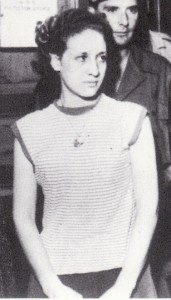Zohra Drif
Modern Picture of Algiers Casbah
There were many small cells and groups who began to organize in the early 50s to try and force the French out, eventually they all came together to form one cohesive group.
After nearly a century of French control, Algerians were more than tired of the colonial presence. The socialist political party FLN (Front de Liberation Nationale in French) or the National Liberation Front was formed to try to offer the Muslim population of Algeria hope for future independence from the French who had killed thousands of innocents, and continued to occupy land which was not theirs.
In November of 1954 there was an armed rebellion by Muslim forces. There were some skirmishes between French troops and the FLN, but it failed to gain international attention. The FLN wanted their voices to be heard, and wanted the world to take notice of their struggle. Media attention would gain traction for their trajectory toward freedom.
In 1956 the FLN decided to begin to direct their efforts towards the capital city of Algiers to gain international attention, and also to combat the thousands of troops being sent to Algeria by the French government in 1956.
By May, around 250,000 troops had been deployed and there were frequent raids in the Casbah of Algiers. The FLN didn’t want to negotiate, and by the next month the French Prime Minister Guy Mollet increased the military presence to 400,000.
The FLN began ordering random killings of French officials, The french bombed the casbah back in retaliation. Many Muslim residents sought to get revenge and planned to move into the French Quarter in a mob and inflict violence. The French had caught wind of the idea, and it was sure going to be a bloody exchange if followed through.
Yacef Saadi, the military leader of the Algiers FLN, sent his lieutenants to tell the mob to turn around to minimize civilian deaths. The FLN swore they would avenge the people of the Casbah.
The FLN began bombing French police stations and administrative institutions, as well as popular hang outs of French civilians. An infamous incident of such was on September 30th of 1956. A young woman Zohra Drif planted a bomb in “Milk Bar Cafe” killing three and critically wounding many others.
Because there were curfews and blockades around the Casbah, they used Drif to plant the bomb, as she had a lighter complexion and could pass for French when the curfew was in affect.
In 1957 the FLN sought to argue on their behalf to the United Nations that they were a legitimate political party and not a terrorist group who had the support of the Algerian Muslim population.
They planned a strike among shop owners and workers, yet after only eight days the French broke them down with force.
The FLN carried on with random killings. Soon Jacques Massu was appointed as leader of the French forces. He was a fierce military leader, and after the blunder of the French’s war with Vietnam, they wanted to avoid such an outcome in Algeria.
Massu was not opposed to extreme tactics against his FLN enemies. He was able to justify such treatment, as there had been much violence and brutality to French women and children, and their attacks were often at times when the military personnel were unaware and unable to fight back.
They eventually captured Ben M’Hidi, the FLN’s leader, it was a big media gesture. He eventually died in prison. The formal explanation was that he killed himself in his cell, but it is more likely he was tortured to the point of death.
The French would win the Battle of Algiers, but would go on to lose the war. There were around 1,000,000 casualties over the course of the struggle. And while both sides were suffering heavy losses, the Algerians could sustain it theoretically, yet the French could no longer politically justify such a heavy loss of life for a war not concerning their domestic country.
Charles De Gaulle, leader of France, decided to pull out. So the FLN succeeded in driving the French out.
The interesting thing about the FLN, is that they used very controversial means to achieve their freedom. Bombings of public buildings with much loss of innocent life is hard for me to justify. I know their cause was an important one to them, but it is morally disgusting to me. Yet, the French killed many innocents as well, and over time committed genocide. So, I suppose the rebels were merely firing back in accordance with what the French had done and were doing. If viewed through a Machiavellian lens, the end justified the means. A downtrodden people who had been oppressed and recognized as less than people had gained back the territory that was naturally theirs.
Zohra Drif, whom I mentioned earlier, would serve later in the Algerian government. While she and her counterparts may have used terroristic and dirty methods, they had something they wanted to accomplish, and many among the Muslim population saw the FLN as heroes beating the oppressors out of their homeland.
Sources:
http://www.sjsu.edu/faculty/watkins/algeria.htm
http://www.princeton.edu/~achaney/tmve/wiki100k/docs/Algerian_War.html




